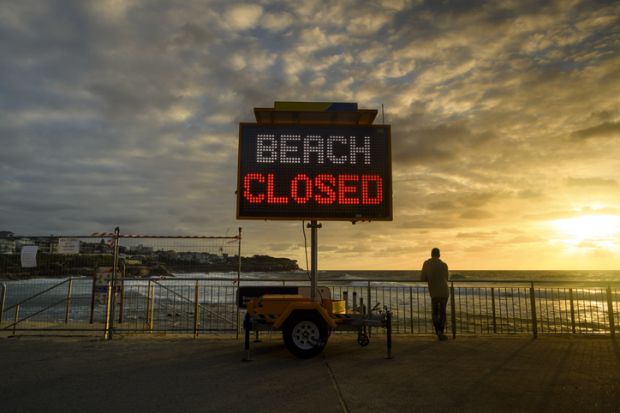Academics who have stuck to their science during Covid have nevertheless found themselves embroiled in policy disagreements, an Australian forum has heard.
Deakin University epidemiologist Catherine Bennett said political leaders’ practice of “overstating the science” – by portraying certain aspects of Covid restrictions as science-based, when in fact they were applied for other reasons – had “pushed more people into the sceptical basket” during the coronavirus crisis.
Professor Bennett said leaders had used epidemiological grounds to justify lockdown measures employed for enforcement purposes. This had put scientists in a difficult position, reluctant to undermine public health efforts but unwilling to misrepresent those aspects of the restrictions as science-based.
People recognised that some measures had not been applied for scientific reasons, she told a webinar hosted by Deakin’s Research for Educational Impact centre. “And we as scientists couldn’t defend it. When we were asked, ‘What does the curfew do?’ we couldn’t defend it. When we were asked, ‘Why are we still in lockdown [after] weeks with no cases?’, we couldn’t defend it.
“You’re…pulled into the lens as a scientist [when it is] no longer specifically about the science. That’s a challenge. I’m hoping that…science won’t bear the burden of too many of those decisions.”
Public trust in science had also been eroded by “mixed messages”, as different Australian states rolled out different containment measures. “If our leaders…are listening to the science, as they always say, then why is the response different? When you don’t have consistency across states or between state and federal [governments], that contributes to some of the difficulty.
“If you’re expressing science that is seen to support a policy [which] someone takes a very strong position on, you are not talking science – you are talking policy. And you are classified within that context,” she said.
She said she had been castigated as a dictator’s “mouthpiece” for advocating lockdowns and offered a tin hat for not believing in lockdowns, all in the same week. “People will attack the science, and if they can’t get satisfaction with that, they will attack the scientists.”
Academics had also been played off against each other, as quickfire interviews with commentators with different specialties – or different access to information – exposed disagreements between experts whose views might have converged “if you had them in a room together, having a conversation”.
She said had encouraged communication among Australia’s epidemiologists, to share information rather than to achieve consensus. “But, generally, we find we’re very much on the same page.”
Australian National University vice-chancellor Brian Schmidt said policy characterised as evidence-based was often merely “evidence-informed”, with political decisions and other “contextual bits” contributing to the finished product.
“What we do in the public sphere is really hard and ambiguous,” Professor Schmidt told the forum. “We need to be very careful about where we’re on solid ground, and where we’re going on to other ground.”
Deakin University science historian Alexandra Roginski said the pandemic had opened a window on the apparently chaotic interplay of science and policy. “This is a unique moment in terms of people being able to [get] under the bonnet of science to see how a lot of these discussions and processes take place,” she said.







